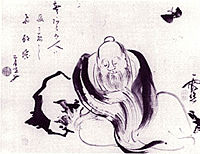
While the Tao Te Ching of Lao Tzu is considered the classic Taoist text, with delightful verses about the usefulness of nothing and the virtues of simplicity, if you’re looking for Taoist stories then your best bet is in the little book of Chuang Tzu.
As you’ll see in the following tales, there’s a gentle irony in Chuang Tzu that brings out the heart of Taoism wisdom, allowing the meaning to float to the top of your mind all by itself. Take for example the following tale about the Taoist virtue of taking it easy:
There was once a man who was terrified of his own shadow and lived in fear of the sound of his own footsteps. Walking along one day he entered a panic and tried to flee at top speed. But as fast as he ran, his shadow and footsteps kept up with him and made him run all the faster, until he finally collapsed of exhaustion and died.
If he had only sat down in the shade of a tree, he would no longer have have been able to see his shadow or hear his own footsteps.
Many Taoist concepts are hard to translate and it’s not clear if language or culture is the obstacle. The concept of non-action, for instance, sounds as though the ancient Taoists never got anything done. Rather it seems to be about the wisdom of letting Nature do the work for you as much as possible, as the following Taoist story of the Butcher illustrates.
There was once a butcher who was carving a joint of meat for a customer who had been coming for many years.
“Pardon me,” the customer asked, “But isn’t that the same knife you had last year? Do you need to sharpen it often?”
“It’s the same knife I’ve had for the last 17 years,” the butcher replied, “And I haven’t had to sharpen it even once. For, when I cut the meat, I allow the knife to find its own way through the flesh without effort or stress.
“And when I come to a tricky bit with lots of cartilage, I just slow down and allow the mystery to solve itself and in no time the meat falls right off the blade.”
Some Taoist stories are perhaps a little harder to immediately grasp and even tend towards Zen in their abstrusity. Take, for example, a story from another Taoist master, Lieh Tzu:
There was once a lord who wished for a new horse and he asked his advisor where a fine specimen might be found. The advisor thought for a moment and then declared that he had an old friend who was expert in the qualities of horses and that he would send at once for his best animal. A letter soon arrived from his friend in the country announcing that he would soon be sending a black stallion as a gift to the lord. When the horse arrived however, it turned out to be a brown mare.
‘You said your friend was an expert!’ the lord complained, ‘But he doesn’t even know the colour or sex of his won horses!’
‘Ah, has he really come as far as that?’ the advisor sighed in admiration. ‘So keen is his sight that he no longer even sees the outer characteristics of the horse, only its inner quality.’
The old Taoist poets, storytellers and sages had little time for worldly success. After all, the famous three Chinese curses are:
May you live in interesting times.
May all your wishes be granted.
And crucially:
May you come to the attention of important people.
Take Lao Tzu, for instance, author of the Taoist classic the Tao Te Ching; legend has it that he was walking out of the kingdom into the mountains, determined to leave the corrupting influences of society behind forever and immerse himself in nature. The gatekeeper on the road begged him to stay and dedicate his life to teaching but, seeing Lao Tzu had made up his mind, he begged the sage to at least write down his wisdom before he left. The result is the classic poem, the Tao Te Ching which begins by declaring that
The Way that can be spoken is not the Way
and
Those who speak do not know and those who know do not speak.
Thus when the Emperor sent his men to bring back the sage, Chuang Tzu, that he might live in palace and give him good advice, it’s of little surprise that he declined the honour when the soldiers found him in the shade of an old tree. He explained his decision by way of a story:
“There was a turtle who was sitting in a mud pool when he was captured and taken to the palace to be sacrificed there. It was, of course, a great honour but don’t you suppose he might have been happier in his pool of mud?”
“Of course.” The soldiers answered.
“Then leave me be in my pool of mud and be gone.”







